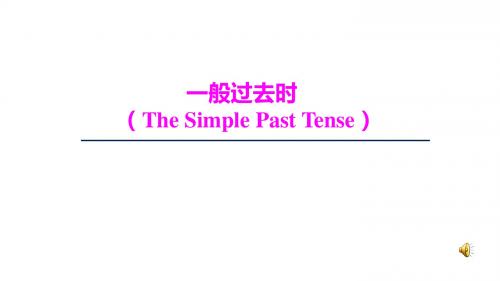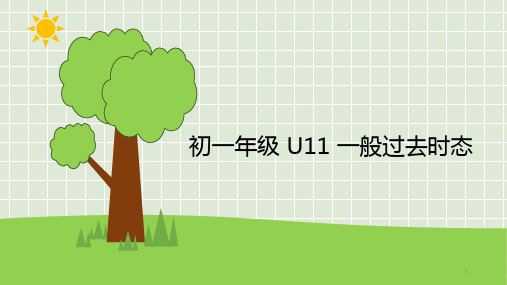人教版英语七年级下一般过去时课件
合集下载
初中英语人教版七年级下册微课课件

A: What did ___ you do yesterday? B: I _____ went to the movie.
A: What did ___ you do last weekend? B: I did ___ my homework.
What did you do ___ last weekend? We ____________________ visited the fire station. How was ___ your trip last weekend? It was boring. do last weekend? What did they ___ Theypicked ______________________ some strawberries. How were ____ the strawberries? They were delicious.
地点 Where did she work last year?
主语 Who worked in a hospital last year?
every day yesterday
• I get home at 5:00 every day. I got home at 5:00 yesterday. • Jack sees a movie every day. Jack saw a movie yesterday. • She buys lunch in the shop every day. She bought lunch in the shop yesterday. • There are many people in our school every day. There were many people in our school yesterday.
_Unit11 SectionA 一般过去时态专项讲解 课件人教版英语七年级下册

stopped planned tripped
4. 结尾是“辅音字母+y”的动词, study studied
先变“y”为“i”再加-ed
carry carried
Infinitive am is are begin break bring build buy can
不规则动词表
Past tense was were begun broke brought built bought could
动词
变化来表现的
Please look at the sentences
我今年12岁. I _a_m_ 12 years old this year.
我去年11岁. I _w_a_s_ 11 years old last year.
他现在在北京。 He __is__ in Beijing now. 他昨天在上海。 He _w_a_s_ in Shanghai yesterday.
他们今天在中国。 T They _w_e_re_ in Japan yesterday.
am/ is are
was were
I get up at 6:30 every morning. I _g_ot_ up at 9:00 last Sunday. He plays football every afternoon. He _pl_a_y_ed_ basketball yesterday afternoon.
一般过去时态
什么是一般过去时?
一般过去时表示过去某个时间发生的动 作或存在的状态。常和表示过去的时间 连用。如:last year, yesterday等.
我每天去上学。 我昨天去上学。 他每天下午都去打篮球。 他上星期一打篮球。
4. 结尾是“辅音字母+y”的动词, study studied
先变“y”为“i”再加-ed
carry carried
Infinitive am is are begin break bring build buy can
不规则动词表
Past tense was were begun broke brought built bought could
动词
变化来表现的
Please look at the sentences
我今年12岁. I _a_m_ 12 years old this year.
我去年11岁. I _w_a_s_ 11 years old last year.
他现在在北京。 He __is__ in Beijing now. 他昨天在上海。 He _w_a_s_ in Shanghai yesterday.
他们今天在中国。 T They _w_e_re_ in Japan yesterday.
am/ is are
was were
I get up at 6:30 every morning. I _g_ot_ up at 9:00 last Sunday. He plays football every afternoon. He _pl_a_y_ed_ basketball yesterday afternoon.
一般过去时态
什么是一般过去时?
一般过去时表示过去某个时间发生的动 作或存在的状态。常和表示过去的时间 连用。如:last year, yesterday等.
我每天去上学。 我昨天去上学。 他每天下午都去打篮球。 他上星期一打篮球。
七年级英语下册-一般过去时课件-人教新目标版

• 7. She took a walk last Sunday evening.
否认句:
• 一般疑问句: • 肯定答复: • 否认答复: • 划线提问:
• 7. She took a walk last Sunday evening.
• 否认句: • She didn’t take a walk last Sunday evening. • 一般疑问句: • Did she take a walk last Sunday evening? • 肯定答复:Yes,she did. • 否认答复:No, she didn’t. • 划线提问: • When did she take a walk ?
2〕 在浊辅音或元音后读[d].
learn ― learned 3〕 在[t] 和[d] 后读[id].
start ― started
巧记动词过去时态
动词一般过去时,表示过去发生的事; be用was或用were, have, has变had; 谓语动词过去式,过去时间作标志; 一般动词加-ed,假设是特殊得硬记。 否认句很简单,主语之后didn’t添; 疑问句也不难,did放在主语前; 如果谓语之前有did,谓语动词需复原; 动词假设是was, were,否认就把not添。
四、一般过去时的分类
1.be 动词的一般过去时态:有人称和数的变化 〔am/is 的过去式为was; are的过去式为were.〕
肯定句:主语+was (were) +…
I was late yesterday.
否认句:主语+was (were) +not+…
We weren't late yesterday. 疑问句:Was (Were) +主语+…+?
人教版英语七年级下册-七年级下册 一般过去时 --课件

Exercises
1.I __C__ the number down on a
piece of paper a moment ago.
A. write
B. writed
C. wrote
D. writing
2. Everything _B__ ready before
Father came.
A. were
Yes, he did. No, he didn’t.
Did she use computer?
Yes, she did. No, she didn’t.
Did they have breakfast?
No, they didn’t. They went camping.
用所给动词的适当形式填空。 1. We __li_v_e_d_ (live) in Japan last year. 2. Jack_s_t_o_p_p_e_d_ (stop) the car last Sunday. 3. Tom _c_le_a_n_e_d_ (clean) my room and _st_u_d_ie_d_(study) for the Chinese test last weekend. 4.What __d_i_d__ you __d_o___(do) last night? 5.On Sunday morning I p__la_y_e_d(play) tennis.
11
2. 行为动词(v.)的一般过去时态
(1)肯定句式:主语 + v-ed+ 其它+时间状语 .
【do , does---did】
(2)否定句式:主语 + didn’t + v原形+ 其它+时间状语.
人教版英语七年级下一般过去时课件

返回上页 返回练习 返回首页
改写句子:
PRACTISE
That’s great√
1、Lucy did her homework at home.(改否定句)
Lucy __d_id_n_’_t_ ___d_o___ her homework at home. 2、He found some meat in the fridge.(变一般疑问句)
Yes,you did.
Yes,I did.
Yes,he/she/it did.
work
No,you did not. Did we work?
No, I did not. No,he/she/it did not. Did you work? Did they work?
Yes,we/you did. Yes,we did. Yes,they did. No,we/you did not. No,we did not. No,they did not.
返回上页 返回首页
一般过去时态练习
单击图标进入相应练习
动词过去式转换练习 一般过去时态练习 时态转换练习
返回首页
动词过去式转换练习
将下列动词变为过去式
1. look 4. carry 7. call 10.are 13.do 16.say 19.eat
2. live 5. hope 8. finish 11. go 14.get 17.see 20.take
last night (week, month, year…)
two days ago, a week ago, three years ago…
in 1990, (i过去时,表示过去发生事; be用was或用were, have,has变had; 谓语动词过去式,过去时间坐标志; 一般动词加-ed,若是特殊得硬记。 否定句很简单,主语之后didn’t添; 疑问句也不难,did放在主语前; 如果谓语之前有did,谓语动词需还原; 动词若是was,were,否定就把not添。
改写句子:
PRACTISE
That’s great√
1、Lucy did her homework at home.(改否定句)
Lucy __d_id_n_’_t_ ___d_o___ her homework at home. 2、He found some meat in the fridge.(变一般疑问句)
Yes,you did.
Yes,I did.
Yes,he/she/it did.
work
No,you did not. Did we work?
No, I did not. No,he/she/it did not. Did you work? Did they work?
Yes,we/you did. Yes,we did. Yes,they did. No,we/you did not. No,we did not. No,they did not.
返回上页 返回首页
一般过去时态练习
单击图标进入相应练习
动词过去式转换练习 一般过去时态练习 时态转换练习
返回首页
动词过去式转换练习
将下列动词变为过去式
1. look 4. carry 7. call 10.are 13.do 16.say 19.eat
2. live 5. hope 8. finish 11. go 14.get 17.see 20.take
last night (week, month, year…)
two days ago, a week ago, three years ago…
in 1990, (i过去时,表示过去发生事; be用was或用were, have,has变had; 谓语动词过去式,过去时间坐标志; 一般动词加-ed,若是特殊得硬记。 否定句很简单,主语之后didn’t添; 疑问句也不难,did放在主语前; 如果谓语之前有did,谓语动词需还原; 动词若是was,were,否定就把not添。
人教版七年级下语法教学:一般过去时(Present SimpleTense)课件(共23张ppt)

B: I … A: Oh, sounds great! B: I a...because my mother ….
I love her so much.
Past tense 过去式
regular change 规则变化
原形 过去式wasຫໍສະໝຸດ -__w__a_s_h__e_d__
love-__lo__v_e_d_ stop-__s_t_o_p__p_e_d_worry-__w__o_r_r_ie_ d
She taught me many things when I was little. She helped me with schoolwork when I began my schoolwork. She looked after me so well that I could grow up well. She did quite a lot of these things Just because she loved me.
He/She was really .... He/She taught me .... He/she also helped me.... For me, he/she made me.... .... I am really thankful to him/her.
grandpa, grandma, dad, mom, teacher, friend, volunteer…
On Mother’s last month, students did quite a lot of things for their mothers. Some students in our class ___d_id__a lot of things for mothers. Gina __b_o_u_g_h_t_(buy) a bunch(束) of carnations. Tom ____m__a_d_e___(make) a card by himself. Cathy thinks her mother works too hard, so she _c_le_a_n_e_d_(clean) the living room and __w__a_s_h_ed (wash) the dishes. But only Jimmy ____d__id_n_’_t _d_o__ (not do) anything. He __d_i_d_n_’t_d__ec_i_d_e__(not decide) what to do. All of us hope that our mothers will like these gifts.
I love her so much.
Past tense 过去式
regular change 规则变化
原形 过去式wasຫໍສະໝຸດ -__w__a_s_h__e_d__
love-__lo__v_e_d_ stop-__s_t_o_p__p_e_d_worry-__w__o_r_r_ie_ d
She taught me many things when I was little. She helped me with schoolwork when I began my schoolwork. She looked after me so well that I could grow up well. She did quite a lot of these things Just because she loved me.
He/She was really .... He/She taught me .... He/she also helped me.... For me, he/she made me.... .... I am really thankful to him/her.
grandpa, grandma, dad, mom, teacher, friend, volunteer…
On Mother’s last month, students did quite a lot of things for their mothers. Some students in our class ___d_id__a lot of things for mothers. Gina __b_o_u_g_h_t_(buy) a bunch(束) of carnations. Tom ____m__a_d_e___(make) a card by himself. Cathy thinks her mother works too hard, so she _c_le_a_n_e_d_(clean) the living room and __w__a_s_h_ed (wash) the dishes. But only Jimmy ____d__id_n_’_t _d_o__ (not do) anything. He __d_i_d_n_’t_d__ec_i_d_e__(not decide) what to do. All of us hope that our mothers will like these gifts.
人教版七年级下册Unit11一般过去时语法讲解课件(共67页)

worry – worried 4. 以重读闭音节结尾且末尾只有一个 辅音字
母的动词,双写结尾的辅音字母+ed. 如:stop – stopped plan – planned
15
知识讲 解
cost cut hit put
hurt let read
16
知识讲 解
过去 式
cost
cut
hit
put
一 般 过去时
12
知识讲 解
主语.
谓语 过去式.
宾语.
一 般 过去时
13
知识讲 解
动词过去式变化
规则变化规则变化的动词变过去式在词尾加
不规则变化
14
知识讲解 1. 在动词原形后直接加ed 如:work – worked look – looked
2. 以不发音e结尾的动词,直接加d 如:live – lived hope – hoped use – used 3. 以辅音字母+y结尾的,变y为i加ed 如:study – studied carry – carried
days .
三天前 在以前
30
知识讲 解
31
知识讲 解
麦兜昨天考试不及格。
32
知识讲 解
MaDull failed the exam yesterday.
33
知识讲 解
MaDull failed the yesterday
exam
. 昨天
34
知识讲
解
昨
天
早上
下午
晚上
yesterday morniynegsterday afternyoeosnterday evening
母的动词,双写结尾的辅音字母+ed. 如:stop – stopped plan – planned
15
知识讲 解
cost cut hit put
hurt let read
16
知识讲 解
过去 式
cost
cut
hit
put
一 般 过去时
12
知识讲 解
主语.
谓语 过去式.
宾语.
一 般 过去时
13
知识讲 解
动词过去式变化
规则变化规则变化的动词变过去式在词尾加
不规则变化
14
知识讲解 1. 在动词原形后直接加ed 如:work – worked look – looked
2. 以不发音e结尾的动词,直接加d 如:live – lived hope – hoped use – used 3. 以辅音字母+y结尾的,变y为i加ed 如:study – studied carry – carried
days .
三天前 在以前
30
知识讲 解
31
知识讲 解
麦兜昨天考试不及格。
32
知识讲 解
MaDull failed the exam yesterday.
33
知识讲 解
MaDull failed the yesterday
exam
. 昨天
34
知识讲
解
昨
天
早上
下午
晚上
yesterday morniynegsterday afternyoeosnterday evening
人教七年级下册Unit一般过去时详讲张PPT教学课件

人教七年级下册Unit 11 一般过去时详讲PPT(27张)
人教七年级下册Unit 11 一般过去时详讲PPT(27张)
一般过去时——句式变化(助)
一般疑问: 1. She loved the book last year.
Did she love the book last year? 2. His father bought a watch yesterday.
人教七年级下册Unit 11 一般过去时详讲PPT(27张)
一般过去时
人教七年级下册Unit 11 一般过去时详讲PPT(27张)
目录
CONTENT
知识点
训练
作业
Part 1
知识点
Yesterday Once More
When I was young I'd listen to the radio
过去式
肯定句:主语+was/were+其它
含be动词
否定句:主语+was/were+not+其它
疑问句:Was/Were 提前
含助动词
人教七年级下册Unit 11 一般过去时详讲PPT(27张)
人教七年级下册Unit 11 一般过去时详讲PPT(27张)
否定:
一般过去时——句式变化(助)
1. She loved the book last year.
含be动词
否定句:主语+was/were+not+其它
疑问句:Was/Were 提前
肯定句:主语+ V过去式+其它
含助动词
否定句:主语+didn’t+V原+其它
疑问句:Did提前;谓语动词打回原形
人教七年级下册Unit 11 一般过去时详讲PPT(27张)
一般过去时——句式变化(助)
一般疑问: 1. She loved the book last year.
Did she love the book last year? 2. His father bought a watch yesterday.
人教七年级下册Unit 11 一般过去时详讲PPT(27张)
一般过去时
人教七年级下册Unit 11 一般过去时详讲PPT(27张)
目录
CONTENT
知识点
训练
作业
Part 1
知识点
Yesterday Once More
When I was young I'd listen to the radio
过去式
肯定句:主语+was/were+其它
含be动词
否定句:主语+was/were+not+其它
疑问句:Was/Were 提前
含助动词
人教七年级下册Unit 11 一般过去时详讲PPT(27张)
人教七年级下册Unit 11 一般过去时详讲PPT(27张)
否定:
一般过去时——句式变化(助)
1. She loved the book last year.
含be动词
否定句:主语+was/were+not+其它
疑问句:Was/Were 提前
肯定句:主语+ V过去式+其它
含助动词
否定句:主语+didn’t+V原+其它
疑问句:Did提前;谓语动词打回原形
人教版七年级英语下册 Unit12 一般过去时(The Simple Past Tense)(共23张PPT)

3.She stayed there for a week.(对划线部分提问) _H__o_w_ _lo_n_g__ __d_id___ she _s_ta_y__ there?
Dear Bill, How __w_a_s_ (is) your last weekend? __D_i_d_ (Do) you __h_a_v_e__(have) a good time? I _h_a_d__(have) an interesting weekend. I _t_o_o_k_(take) a bus to my grandparents’ home. I h__el_p_e_d_ (help) them __cl_e_a_n_ (clean) the house. After that, I _co_o_k__ed_ (cook) lunch for them. In the afternoon, we _____ (ttoaokke) a walk in the park.
Jim
Homework
Make up a story. Each student adds a
LassetnwteenkceI .
visited my aunt’s house.
The weather was
beautiful.
We went fishing.
was
were
What did they do last weekend?
Tony
Mike
Mary
climbed the mountain played soccer did her homework
Amy
Bill
Jack
had a picnic
went fishing
Dear Bill, How __w_a_s_ (is) your last weekend? __D_i_d_ (Do) you __h_a_v_e__(have) a good time? I _h_a_d__(have) an interesting weekend. I _t_o_o_k_(take) a bus to my grandparents’ home. I h__el_p_e_d_ (help) them __cl_e_a_n_ (clean) the house. After that, I _co_o_k__ed_ (cook) lunch for them. In the afternoon, we _____ (ttoaokke) a walk in the park.
Jim
Homework
Make up a story. Each student adds a
LassetnwteenkceI .
visited my aunt’s house.
The weather was
beautiful.
We went fishing.
was
were
What did they do last weekend?
Tony
Mike
Mary
climbed the mountain played soccer did her homework
Amy
Bill
Jack
had a picnic
went fishing
Unit11一般过去时课件人教版七年级英语下册

2. There were about nine hundred people at the concert. 否定句:_T_h_e__re__w_e_r_e_n_'_t_a_b_o_u__t _n_in__e_h_u__n_d_r_e_d_p__e_o_p_le__a_t_t_h_e__c_o_n_c_e_r_t. 一般疑问句W__e_r_e_t_h_e_r_e__a_b_o_u_t_n_i_n_e__h_u_n_d_r_e_d__p_e_o_p__le__a_t _t_h_e_c_o_n__c_e_rt_? 对划线部分提问:H__o_w__m__a_n_y_p__e_o_p_l_e_w__e_re__t_h_e_r_e_a_t__th_e__c_o_n_c_e_r_t_?__
注意:助动词did之后动词
肯定回答: Yes, she did.
需还原
否定回答: No, she didn't.
对划线部分提问: Where did Sally go last week?
9
练习:
I. 用括号内所给词的适当形式填空: 1. We _e_n_j_o_y_e__d_ (enjoy) ourselves at the party last night. 2. Jack _s__tu__d_i_e_d____ (study) for the English test last Sunday. 3. __D__i_d__ you __g_o___ (go) to the Great Wall last year? 4. What day __w__a_s__ (be) it yesterday? 5. We __h__a_d___ (have) a party last night. 6. We __v_i_s_it_e__d__ (visit) the museum and went home. 7. — How _w__e_r_e__ (be) the students? — They were very friendly. 8. He often __h_a__s__ (have) supper at home. Today he h__a_d___ (have) supper at school.
注意:助动词did之后动词
肯定回答: Yes, she did.
需还原
否定回答: No, she didn't.
对划线部分提问: Where did Sally go last week?
9
练习:
I. 用括号内所给词的适当形式填空: 1. We _e_n_j_o_y_e__d_ (enjoy) ourselves at the party last night. 2. Jack _s__tu__d_i_e_d____ (study) for the English test last Sunday. 3. __D__i_d__ you __g_o___ (go) to the Great Wall last year? 4. What day __w__a_s__ (be) it yesterday? 5. We __h__a_d___ (have) a party last night. 6. We __v_i_s_it_e__d__ (visit) the museum and went home. 7. — How _w__e_r_e__ (be) the students? — They were very friendly. 8. He often __h_a__s__ (have) supper at home. Today he h__a_d___ (have) supper at school.
人教七年级下册语法精品课件:Unit11 语法 一般过去时(41张)

人教七年级下册语法精品课件:Unit1 1 语法 一般过去时(41张)
人教七年级下册语法精品课件:Unit1 1 语法 一般过去时(41张)
课程引入
内容讲解 课后总结
诊断反馈
Be 动词一般过去时句型变化
小秘密: 肯定句式:. 主语 + be(was , were) + 其它. 否定句式:主语 + be(was , were) + not + 其它. 一般疑问句:Be(was , were) + 主语 + 其它? 特殊疑问句式: 特殊疑问词+be过去式+主语+其他?
3. 时间+ago three weeks ago, 5 days ago, a few month ago….
4. just now.
5. When +过去时句子 when I was born, ... ...
人教七年级下册语法精品课件:Unit1 1 语法 一般过去时(41张)
人教七年级下册语法精品课件:Unit1 1 语法 一般过去时(41张)
人教七年级下册语法精品课件:Unit1 1 语法 一般过去时(41张)
人教七年级下册语法精品课件:Unit1 1 语法 一般过去时(41张)
PART 05
实意动词一般过去时构成
人教七年级下册语法精品课件:Unit1 1 语法 一般过去时(41张)
人教七年级下册语法精品课件:Unit1 1 语法 一般过去时(41张)
PART 5.1
实意动词过去式的变化规则
人教七年级下册语法精品课件:Unit1 1 语法 一般过去时(41张)
人教七年级下册语法精品课件:Unit1 1 语法 一般过去时(41张)
- 1、下载文档前请自行甄别文档内容的完整性,平台不提供额外的编辑、内容补充、找答案等附加服务。
- 2、"仅部分预览"的文档,不可在线预览部分如存在完整性等问题,可反馈申请退款(可完整预览的文档不适用该条件!)。
- 3、如文档侵犯您的权益,请联系客服反馈,我们会尽快为您处理(人工客服工作时间:9:00-18:30)。
语法复习课件
一般过去时
By Geoffrey
知识结构
动词的过去式
构成
一般过去时
用法
1.表示过去某个时 表示过去某个时 间发生的动作或 存在的状态。 存在的状态。 2.表示过去经常或 表示过去经常或 反复发生的动作。 反复发生的动作。
常用时间
yesterday last night in 1990 two days ago
订正答案 返回练习
用动词的过去式填空
1. Did you remembered (remember) to buy the oranges? 2.Who invented (invent) the computer. 3.We went (go) to the cinema last night. The film was (be) very good. 4.What time did you got (get) to school this morning? 5.Jim did (do) a lot yesterday. He went (go) shopping and cooked (cook) supper.
订正答案 返回练习
一般过去时态练习
把下列句子改成相应时态
1. He usually gets up early in the morning. But he got up late today. 2. She usually works from 8 a.m. to 5 p.m. But yesterday she worked from 8 a.m. to 6 p.m. 3. They often go to the park on Sundays. They went to the park last Monday. 4. He reads the newspaper at breakfast. But yesterday he didn’t read the newspaper.
• 、/t/ /d/ 之后念 /id/ , 即 ed 在 /t/ /d/ 音后面念 /id/ 例:wanted shouted needed counted
不规则动词表 Infinitive am is are begin break bring build buy can Past tense was were begun broke brought built bought could Infinitive catch come do draw drink drive eat fall Past tense caught came did drew drank drove ate fell
进入下页 返回首页
there be There were….
一般过去时态句式的构成
疑问句式
动词 第一人称 疑问句式和简略答语 第二人称 第三人称
Was I …? Were you…? Was he/she/it…? Yes, you were. Yes,I was. Yes,he/she/it was. No, you were not. No,I was not. No,he/she/it was not. Were you…? Were they…? be Were we…? Yes,we/you were. Yes,we were. Yes,they were. No,we/you were No,we were No,they were not. not. not. Did you work? Did he/she/it work? Did I work? Yes,you did. Yes,I did. Yes,he/she/it did. No,you did not. No, I did not. No,he/she/it did not. work Did we work? Did you work? Did they work? Yes,we/you did. Yes,we did. Yes,they did. No,we/you did not. No,we did not. No,they did not. Were there any…? Was there a/ any…? there Yes,there was. Yes,there were. No,there were not. be No,there was not.
in 1990, (in 1998…)
巧记动词过去时态
动词一般过去时,表示过去发生事; 动词一般过去时,表示过去发生事; be用was或用 或用were, have,has变had; be用was或用were, have,has变had; 谓语动词过去式,过去时间坐标志; 谓语动词过去式,过去时间坐标志; 一般动词加-ed,若是特殊得硬记。 一般动词加-ed,若是特殊得硬记。 否定句很简单,主语之后didn didn’t 否定句很简单,主语之后didn t添; 疑问句也不难,did放在主语前 放在主语前; 疑问句也不难,did放在主语前; 如果谓语之前有did,谓语动词需还原; 如果谓语之前有did,谓语动词需还原; did 动词若是was,were,否定就把not was,were,否定就把not添 动词若是was,were,否定就把not添。
案
lived 3. stop stopped hoped 6. trip tripped finished 9. want wanted went 12.have had got e came saw 18.put put took 21.read read
返回练习
订正答案 返回上页
动词过去式转换练习
答
1. look looked 4. carry carried 7. call called 10.are were 13.do did 16.say said 19.eat ate 2. live 5. hope 8. finish 11.go 14.get 17.see 20.take
返回上页
返回首页
规则动词过去式的构成 构成规则 1. 一般在动词原形末尾加 一般在动词原形末尾加-ed look play start live hope use stop plan trip 例词 looked played started lived hoped used stopped planned tripped studied carried
返回上页 返回练习 返回首页
一般过去时态练习
把下列句子改成相应时态
1. He usually gets up early in the morning. But______________________late today. 2. She usually works from 8 a.m. to 5 p.m. But yesterday __________________________ 3. _____________________ on Sundays. They went to the park last Monday. 4. _____________________at breakfast. But yesterday he didn’t read the newspaper.
• 说明: 说明: • 1、清念 /t/ ,即 ed 在清辅音 、 后面念 /t/ , • 例:finished helped passed cooked
• 元浊 /d/ ,即 ed 在元音,浊 在元音, 即 辅音后面念 /d/ , 例:borrowed enjoyed called moved
构成 规则动词 动词过去式 的构成 不规则动词 读音
一般过去时态句式的构成
陈述句式
动词 肯定式 否 定 式 I was …. I was not(wasn’t)…. He /She/it was…. He/She/It was not(wasn’t)…. be We/You/They were …. We/You/They were not (weren’t)… I/You/He/She/It/We/ work You/They worked. There was …. I/You/He/She/It/We/You/They did not(didn’t) work. There was not (wasn’t) …. There were not (weren’t)….
常用时 间 常与一般过去时态连用的时间有: 常与一般过去时态连用的时间有:
yesterday yesterday morning (afternoon, evening…) last night (week, month, year…) two days ago, ago… a week ago, three years
返回上页 返回首页
一般过去时态练习
单击图标进入相应练习
动词过去式转换练习 一般过去时态练习 时态转换练习
返回首页
动词过去式转换练习
将下列动词变为过去式
1. look 4. carry 7. call 10.are 13.do 16.say 19.eat 2. live 5. hope 8. finish 11. go 14.get 17.see 20.take 3. stop 6. trip 9. want 12.have e 18.put 21.read
2. 结尾是 e 的动词加 -d
3. 末尾只有一个辅音字母的重读 闭音节词, 闭音节词,先双写这个辅音字 再加-ed 母,再加
4. 结尾是“辅音字母 结尾是“辅音字母+y”的动词, study 的动词, 的动词 carry 先变“ 为 再加-ed 先变“y”为“i”再加 再加
规则动词-ed的读音 规则动词 的读音 元浊/d/ 清念 /t/ ,元浊 ; 元浊 说明: 说明: /t/ /d/ 之后念 之后念/id/
一般过去时
By Geoffrey
知识结构
动词的过去式
构成
一般过去时
用法
1.表示过去某个时 表示过去某个时 间发生的动作或 存在的状态。 存在的状态。 2.表示过去经常或 表示过去经常或 反复发生的动作。 反复发生的动作。
常用时间
yesterday last night in 1990 two days ago
订正答案 返回练习
用动词的过去式填空
1. Did you remembered (remember) to buy the oranges? 2.Who invented (invent) the computer. 3.We went (go) to the cinema last night. The film was (be) very good. 4.What time did you got (get) to school this morning? 5.Jim did (do) a lot yesterday. He went (go) shopping and cooked (cook) supper.
订正答案 返回练习
一般过去时态练习
把下列句子改成相应时态
1. He usually gets up early in the morning. But he got up late today. 2. She usually works from 8 a.m. to 5 p.m. But yesterday she worked from 8 a.m. to 6 p.m. 3. They often go to the park on Sundays. They went to the park last Monday. 4. He reads the newspaper at breakfast. But yesterday he didn’t read the newspaper.
• 、/t/ /d/ 之后念 /id/ , 即 ed 在 /t/ /d/ 音后面念 /id/ 例:wanted shouted needed counted
不规则动词表 Infinitive am is are begin break bring build buy can Past tense was were begun broke brought built bought could Infinitive catch come do draw drink drive eat fall Past tense caught came did drew drank drove ate fell
进入下页 返回首页
there be There were….
一般过去时态句式的构成
疑问句式
动词 第一人称 疑问句式和简略答语 第二人称 第三人称
Was I …? Were you…? Was he/she/it…? Yes, you were. Yes,I was. Yes,he/she/it was. No, you were not. No,I was not. No,he/she/it was not. Were you…? Were they…? be Were we…? Yes,we/you were. Yes,we were. Yes,they were. No,we/you were No,we were No,they were not. not. not. Did you work? Did he/she/it work? Did I work? Yes,you did. Yes,I did. Yes,he/she/it did. No,you did not. No, I did not. No,he/she/it did not. work Did we work? Did you work? Did they work? Yes,we/you did. Yes,we did. Yes,they did. No,we/you did not. No,we did not. No,they did not. Were there any…? Was there a/ any…? there Yes,there was. Yes,there were. No,there were not. be No,there was not.
in 1990, (in 1998…)
巧记动词过去时态
动词一般过去时,表示过去发生事; 动词一般过去时,表示过去发生事; be用was或用 或用were, have,has变had; be用was或用were, have,has变had; 谓语动词过去式,过去时间坐标志; 谓语动词过去式,过去时间坐标志; 一般动词加-ed,若是特殊得硬记。 一般动词加-ed,若是特殊得硬记。 否定句很简单,主语之后didn didn’t 否定句很简单,主语之后didn t添; 疑问句也不难,did放在主语前 放在主语前; 疑问句也不难,did放在主语前; 如果谓语之前有did,谓语动词需还原; 如果谓语之前有did,谓语动词需还原; did 动词若是was,were,否定就把not was,were,否定就把not添 动词若是was,were,否定就把not添。
案
lived 3. stop stopped hoped 6. trip tripped finished 9. want wanted went 12.have had got e came saw 18.put put took 21.read read
返回练习
订正答案 返回上页
动词过去式转换练习
答
1. look looked 4. carry carried 7. call called 10.are were 13.do did 16.say said 19.eat ate 2. live 5. hope 8. finish 11.go 14.get 17.see 20.take
返回上页
返回首页
规则动词过去式的构成 构成规则 1. 一般在动词原形末尾加 一般在动词原形末尾加-ed look play start live hope use stop plan trip 例词 looked played started lived hoped used stopped planned tripped studied carried
返回上页 返回练习 返回首页
一般过去时态练习
把下列句子改成相应时态
1. He usually gets up early in the morning. But______________________late today. 2. She usually works from 8 a.m. to 5 p.m. But yesterday __________________________ 3. _____________________ on Sundays. They went to the park last Monday. 4. _____________________at breakfast. But yesterday he didn’t read the newspaper.
• 说明: 说明: • 1、清念 /t/ ,即 ed 在清辅音 、 后面念 /t/ , • 例:finished helped passed cooked
• 元浊 /d/ ,即 ed 在元音,浊 在元音, 即 辅音后面念 /d/ , 例:borrowed enjoyed called moved
构成 规则动词 动词过去式 的构成 不规则动词 读音
一般过去时态句式的构成
陈述句式
动词 肯定式 否 定 式 I was …. I was not(wasn’t)…. He /She/it was…. He/She/It was not(wasn’t)…. be We/You/They were …. We/You/They were not (weren’t)… I/You/He/She/It/We/ work You/They worked. There was …. I/You/He/She/It/We/You/They did not(didn’t) work. There was not (wasn’t) …. There were not (weren’t)….
常用时 间 常与一般过去时态连用的时间有: 常与一般过去时态连用的时间有:
yesterday yesterday morning (afternoon, evening…) last night (week, month, year…) two days ago, ago… a week ago, three years
返回上页 返回首页
一般过去时态练习
单击图标进入相应练习
动词过去式转换练习 一般过去时态练习 时态转换练习
返回首页
动词过去式转换练习
将下列动词变为过去式
1. look 4. carry 7. call 10.are 13.do 16.say 19.eat 2. live 5. hope 8. finish 11. go 14.get 17.see 20.take 3. stop 6. trip 9. want 12.have e 18.put 21.read
2. 结尾是 e 的动词加 -d
3. 末尾只有一个辅音字母的重读 闭音节词, 闭音节词,先双写这个辅音字 再加-ed 母,再加
4. 结尾是“辅音字母 结尾是“辅音字母+y”的动词, study 的动词, 的动词 carry 先变“ 为 再加-ed 先变“y”为“i”再加 再加
规则动词-ed的读音 规则动词 的读音 元浊/d/ 清念 /t/ ,元浊 ; 元浊 说明: 说明: /t/ /d/ 之后念 之后念/id/
